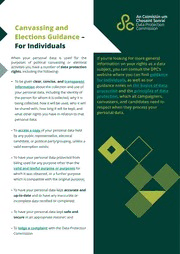
canvassing guidance for individuals PDF
Preview canvassing guidance for individuals
Canvassing and Elections Guidance – For Individuals When your personal data is used for the If you’re looking for more general purposes of political canvassing or electoral information on your rights as a data activities you have a number of data protection subject, you can consult the DPC’s rights, including the following: website where you can find guidance for individuals, as well as our • To be given clear, concise, and transparent guidance notes on the basics of data information about the collection and use of protection and the principles of data your personal data, including the identity of protection, which all campaigners, the person for whom it is collected, why it is canvassers, and candidates need to being collected, how it will be used, who it will respect when they process your be shared with, how long it will be kept, and personal data. what other rights you have in relation to that personal data; • To access a copy of your personal data held by any public representative, electoral candidate, or political party/grouping, unless a valid exemption exists; • To have your personal data protected from being used for any purpose other than the valid and lawful purpose or purposes for which it was obtained, or a further purpose which is compatible with the original purpose; • To have your personal data kept accurate and up-to-date and to have any inaccurate or incomplete data rectified or completed; • To have your personal data kept safe and secure in an appropriate manner; and • To lodge a complaint with the Data Protection Commission Electoral Acts Electoral legislation permits the use of information (including name, address and polling station) which is contained on the electoral register for electoral purposes. This means that public representatives, political parties/ groupings and electoral candidates may use this information to communicate with voters, for example by issuing postal (direct marketing) election leaflets to individuals. The Data Protection Act 2018 modifies the usual right of individuals to object to direct marketing when the direct marketing occurs in the course of electoral activities, so that there is no legal right to object to electoral direct marketing by post. Additionally, electoral legislation allows for any person to access, under certain conditions and within a certain timeframe, the marked version of the electoral register for a particular election which shows whether an individual has voted in that election. Rights When Canvassed Your personal data may be obtained from you through door-to-door canvassing if you agree to provide your personal data in this way, but there is no obligation on you to do so. Personal data doesn’t include all information you share during a face-to-face chat, but it does cover any information relating to you which is recorded electronically or written down and kept on file or added to a database. Public representatives, electoral candidates, their representatives and any political parties/ groupings collecting information about you must put appropriate safeguards in place to accurately record and protect any personal data collected from you, including your political opinions. You should be provided with clear information about what your data protection rights are, how they will handle your data, including how and why it will be used, who it will be shared with, and how long it will be retained. Online and Electronic Canvassing Your rights in relation to electronic direct marketing still apply in the context of canvassing (i.e. texts, emails, phone calls, or faxes) carried out by public representatives, electoral candidates, or political parties/ groupings. Therefore, you should only receive such communications if you have consented to receive them. You must also be informed of the identity of the sender in any such communications and be provided with a simple and easy- to-use way of opting-out of further such communications. You must be able to withdraw your consent as easily as you gave it. You may also encounter online political advertising, either through candidate or party websites, or through other online services or platforms, such as social media. If your personal data is being used to direct these ads, then whoever is responsible for those ads will need to be transparent about how your data is being used, including what their legal basis for doing so is, and with whom they are sharing your personal data. Some online platforms also provide tools to allow you see how and why you are receiving certain ads, and in the case of political ads, how they are being funded. Balancing Rights Data protection rights are not absolute and the General Data Protection Regulation (GDPR) recognises that they must be balanced against the public interest in ensuring the effective operation of a democratic society. This means that an individual’s data protection rights may, in certain circumstances, be restricted in accordance with the law – such as where it is necessary to facilitate the functioning of the electoral system. Under the Data Protection Act 2018, there are certain restrictions on an individual’s right to object to processing personal data, where it is done in the course of electoral activities. Nevertheless, these restrictions on the right to object do not affect the other rights of individuals or obligations of campaigners when it comes to electoral activities – there must still be a valid justification for processing the personal data, and other rights, such as the right to be informed, must be respected.
